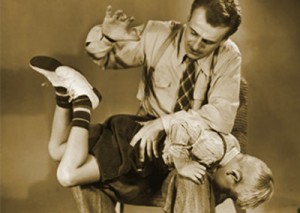Spare the Rod...
It's not a bad case, as domestic violence cases go. My client Jorge discovered that his 17-year-old daughter had gone to the homecoming  dance with someone he'd forbidden her to see, so he slapped her a few times. He's got a couple priors, though, which makes this a 3rd degree felony.
dance with someone he'd forbidden her to see, so he slapped her a few times. He's got a couple priors, though, which makes this a 3rd degree felony.
There are some facts which are not, shall we say, helpful. Like that his daughter's about 4'9", and weighs maybe 90 pounds. And she claims that the slaps caused her to bleed out of the corner of her eye. Her glass eye. Which replaced the one she lost to cancer when she was three. No, I'm not making that up.
It's a defensible case, though. I can hold my own as a trial lawyer, but I don't do it enough to be really good at it. But if I can make a case about the law, I'm going to win most of the time, and I can make this one about the law. Domestic violence normally requires only the infliction of "physical harm," which can be something as insubstantial as a shove. Back in State v. Suchomski, though, the Ohio Supreme Court held that a parent couldn't be convicted for "proper and reasonable parental discipline."
So my BFF Lexis and I spend an afternoon together, and we come up with some good stuff. There's State v. Hause, where the father punched his son in the face with his fist, leaving a "red mark." In State v. Adaranijo, daddy punched his 13-year-old daughter in the leg and lovingly threatened to "beat the shit" out of her. And there's State v. Wagster, where pops slapped his 12-year-old daughter with the back of his hand, causing her lip to blood, and turning it blue and swollen for several days. In each case, the appellate court reversed a conviction for domestic violence, holding as a matter of law that this didn't constitute a sufficient injury for a conviction of domestic violence.
I put that all together in a trial brief, and throw in a couple of cases, for comparison purposes, where the evidence was deemed sufficient. My favorite there was State v. Dickson, where papa drop-kicked his three-year-old daughter about five feet. Runner-up was State v. McClure, where the defendant threw his step-daughter over a couch, kicked her as she was lying on the floor, and then, when she ran outside, chased and tackled her and "began pounding her head on the ground three or four times" before dragging her back into the house.
Kids. What're you gonna do?
I've got some great law, and a good judge, but the problem is that Jorge wants a jury. He wants to make this about whether he did the right thing. I don't; I want to make it about whether he committed a crime, and I certainly don't want four or five people on a jury panel who think that even giving Little Susie a time-out pushes the parental-discipline envelope.
I finally convince Jorge to waive. The girl testifies that he slapped her twice, then quickly elevates that to five or six times. By the time I finish my cross, it's up to thirty. The detective's next, and I know from previous pretrials that he's got a real hard-on for Jorge, so I stay away from his main line, which is that Jorge wouldn't let him meet with the daughter alone. Instead, I focus on the fact that Cleveland cops were called out to the house the night of the incident, without anybody being arrested or taken away. I take him through the training cops get in handling DV cases, through the injuries the girl claimed to have -- scratches, bruises, the bleeding eye -- then ask him whether it would've been proper procedure for a police officer who'd seen all that to leave the girl in the house, let alone not arrest the father. What's he going to say?
Jorge wants to take the stand to tell his life story, but I talk him out of that, too. The judge acknowledges my trial brief, and pointedly asks the prosecutors if they've got any law to the contrary. They don't.
A week later, we're there for the verdict, and the judge acquits Jorge, then suggests, off the record, that maybe he should get some anger management counseling. Jorge tells him that he didn't hear the whole story, but I assure the judge that he heard enough of it, and quickly hustle Jorge out of the courtroom.
Jorge still owes me a grand, which has been promised for about four months now. He hands me a hundred and tells me I can trust him for the rest. His trust is more limited; he wants a receipt. He's still moaning as I write him one. "I'm not saying you did a bad job trying the case," he tells me.
I hand him the receipt, then walk out of the courthouse, warmed by the knowledge that Jorge doesn't think I did a bad job for him.
Clients. What're you gonna do?
Comments